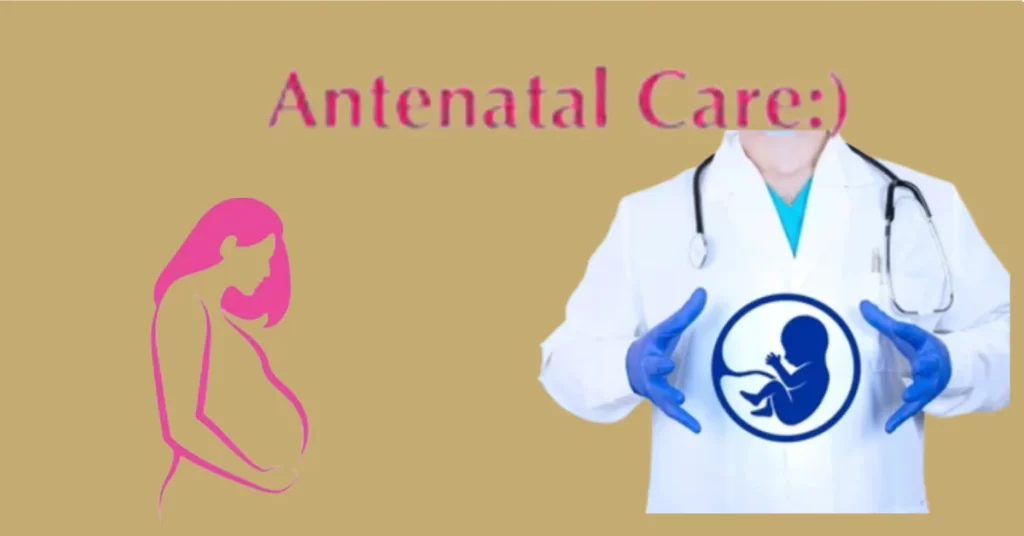A Comprehensive Guide to Antenatal Care

Antenatal care (ANC) is a crucial component of a healthy pregnancy. This blog provides an in-depth overview of ANC, including its objectives, how gestational age is determined, when to attend ANC, the number of visits required, ultrasound during ANC, important signs during pregnancy, complications that can be prevented or minimized by good ANC, and uncomfortable situations that pregnant women may face. Written in a professional tone, this blog is aimed at expectant mothers and anyone interested in learning more about ANC.
Introduction:
Expectant mothers have a lot to think about during pregnancy, and antenatal care is one of the essential things to consider. Antenatal care is a type of medical care that pregnant women receive to ensure a healthy pregnancy and safe delivery.In this blog, we will explore the objectives of ANC, how gestational age is determined, when to attend ANC, the number of visits required, ultrasound during ANC, important signs during pregnancy, complications that can be prevented or minimized by good ANC, and uncomfortable situations that pregnant women may face.
Definition of Antenatal Care:
Antenatal care is a type of medical care that is provided to pregnant women to ensure a healthy pregnancy and safe delivery. It can also be defined as a careful, systematic assessment and follow-up of pregnant patient to ensure best health of the mother and fetus. It involves a series of medical check-ups, tests, and advice to help detect and prevent health problems that may affect the mother and/or the baby.
Objectives of ANC:
The primary objectives of antenatal care are to ensure a healthy pregnancy, detect and prevent any potential health problems, ensure proper fetal growth and development, and prepare the mother and family for childbirth and early parenthood.
How is Gestation Age Determined?
Gestation age is determined by the first day of the last menstrual period (LMP), which is used to calculate the due date. Gestational age can also be determined by ultrasound, which is usually done between 8 to 12 weeks of pregnancy.
• 1st trimester (the best & most accurate): Measure crown-rump (CRL ± 5 days).
• 2nd trimester: BPD, HC, AC, FL ± 10 days
• 3rd trimester (much less accurate)
How Early Should a Pregnant Mother Attend ANC:
Pregnant women should attend ANC as early as possible, preferably during the first trimester (within the first 12 weeks of pregnancy). Early ANC can help detect and prevent any potential health problems and ensure proper fetal growth and development.
How often should patients be seen?
• 1st visit in early pregnancy:
• Then every 4 weeks until 28 weeks.
• Then every 2 weeks until 36 weeks.
• Then weekly until delivery.
• For high risk patients, individualized and more visits.
How Many Visits Should a Pregnant Woman Have:
The number of ANC visits required depends on the country’s health care system and the risk level of the pregnancy. In general, low-risk pregnancies require fewer visits (around four to six visits), while high-risk pregnancies may require more frequent visits.
Ultrasound During ANC: Ultrasound is a crucial component of ANC that helps detect and monitor the fetal growth and development, detect any potential abnormalities, and determine the due date.
1. 1st trimester:
• Diagnose pregnancy.
• Assure accurate dating.
• Fetal number.
• Fetal viability.
• Adnexial mass (corpus luteum cyst to support pregnancy up to 12w).
• Chromosomal anomalies screen (10-14w) as nuchal translucency & nasal bone.
2. 2nd trimester:
• Detailed anomalies scan (18-20w), check hands, digits, number of phalanx, foot, toes, spine, vertebrae…
• Placental localization.
3. 3rd trimester:
• Indicated in high risk pregnancy
- Growth & fetal welfare parameters (fetal movement, breathing, tone & AF volume).
Important Signs during Pregnancy:
Pregnant women should be aware of the important signs during pregnancy, such as vaginal bleeding, severe headaches, high fever, decreased fetal movement, and others. These signs can indicate potential health problems that require medical attention.
• Vaginal bleeding (early or late).
• Abdominal or pelvic pain.
• Uterine contractions from 20-36 weeks.
• Leaking of fluid from vagina (PROM).
• Decrease in fetal movements.
• Severe headache or blurring of vision (preeclampsia).
• Swelling of hands or face.
• Persistent vomiting (hyperemesis gravidarum in 1st trimester).
• Fever.
Complications of Pregnancy That Can Be Prevented or Minimized by Good ANC:
Good antenatal care can prevent or minimize potential complications of pregnancy, such as preterm labor, preeclampsia, gestational diabetes, and others.
What Are Some Uncomfortable Situations Faced During Pregnancy:
Pregnancy can come with some uncomfortable situations, such as morning sickness, fatigue, constipation, back pain, and others. These situations can be managed with proper care and advice from healthcare providers.
Summarization:
Antenatal care is a crucial component of a healthy pregnancy and safe delivery. It involves a series of medical check-ups, tests, and advice to ensure a healthy pregnancy, detect and prevent any potential health problems, ensure proper fetal growth and development, and prepare the mother and family for childbirth and early parenthood.
Pregnant women should attend ANC as early as possible and have the required number of visits based on the country’s healthcare system and the risk level of the pregnancy. Ultrasound is a crucial component of ANC that helps detect and monitor the fetal growth and development, detect any potential abnormalities, and determine the due date. Good antenatal care can prevent or minimize potential complications of pregnancy, and pregnant women may face uncomfortable situations that can be managed with proper care and advice from healthcare providers.






Responses